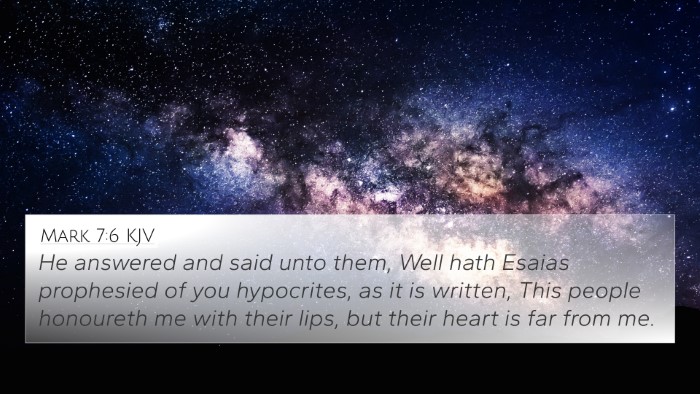Understanding Jeremiah 12:2
Verse: "Thou hast planted them, yea, they have taken root: they grow, yea, they bring forth fruit: thou art near in their mouth, and far from their reins." - Jeremiah 12:2
Interpretation
The verse from Jeremiah 12:2 reflects deep theological themes regarding God's relationship with humanity, particularly the contrast between outward appearance and inner reality. In this verse, the prophet Jeremiah observes the prosperity of the wicked and expresses concern over the seeming absence of divine judgment. Let’s delve into the insights provided by noted public domain commentaries.
Commentary Insights
-
Matthew Henry:
Henry emphasizes that God's judgment may appear delayed but is ultimately certain. The phrase "thou art near in their mouth" suggests that while the people may profess allegiance to God, their hearts remain distant from Him. This stark contrast exemplifies hypocrisy and the need for true devotion beyond mere words.
- He highlights that the wicked may flourish temporarily, but their end is destruction.
-
Albert Barnes:
Barnes notes that the imagery of planting and roots indicates that these individuals have become established in their wickedness, flourishing in their evil ways. This establishes a crucial point that prosperity does not equate to divine favor.
- He elaborates that this verse should encourage believers, proving that apparent worldly success is misleading when it comes to godliness.
-
Adam Clarke:
Clarke discusses the theme of divine presence versus the distance of the heart from God. He interprets the verse to align with God’s recognition of the wicked's outward show of piety while knowing their inner corruption.
- He also connects this verse to the importance of genuine faith, underscoring the need for the heart to align with what is professed.
Cross-References to Jeremiah 12:2
This verse connects to several others within the Bible, allowing for a more comprehensive understanding through Bible verse cross-references. Here are some notable references:
- Psalms 73:3-19: Explores the prosperity of the wicked and the psalmist's struggle with understanding God's justice.
- Matthew 15:8-9: Jesus quotes Isaiah, underscoring the disconnect between lip service and true devotion.
- Isaiah 29:13: Highlights the notion of worship that is only on the surface, much like the theme in Jeremiah 12:2.
- James 1:22: Stresses the importance of being doers of the word, not merely hearers, paralleling the insufficiency of mere verbal profession.
- Romans 2:28-29: Discusses true circumcision of the heart versus the outward signs, illustrating the need for inner transformation.
- Proverbs 29:26: Comments on dependence on the favor of rulers but emphasizes divine sovereignty over both the wicked and the just.
- Jeremiah 7:9-10: Critiques the people's false trust in outward appearances and rituals while living unjustly.
Connections Between Bible Verses
The thematic elements in Jeremiah 12:2 create an intricate web of connections between Bible verses. This underscores the biblical narrative’s consistency emphasizing the need for genuine faith and the danger of hypocrisy.
For individuals interested in cross-referencing biblical texts, tools such as a Bible concordance and Bible cross-reference guide can facilitate the exploration of related themes. Understanding how to use Bible cross-references effectively enables deeper insights into scripture and enriches personal bible study practices.
Comparative Bible Verse Analysis
A comparative analysis of Bible verses can bring additional clarity to the themes found in Jeremiah 12:2. By examining the interconnectivity of scripture, one can appreciate the cumulative message that God desires authenticity in faith.
Utilizing bible reference resources and comprehensive Bible cross-reference materials will enhance your ability to understand these rich themes effectively.
Final Thoughts
In summary, Jeremiah 12:2 serves as a poignant reminder of the disparity between outward religiosity and the inner truth of one's heart. The insights gathered from noted public domain commentaries, along with the related scripture, amplify the importance of pursuing a sincere relationship with God, impervious to the misleading appearances of prosperity.












